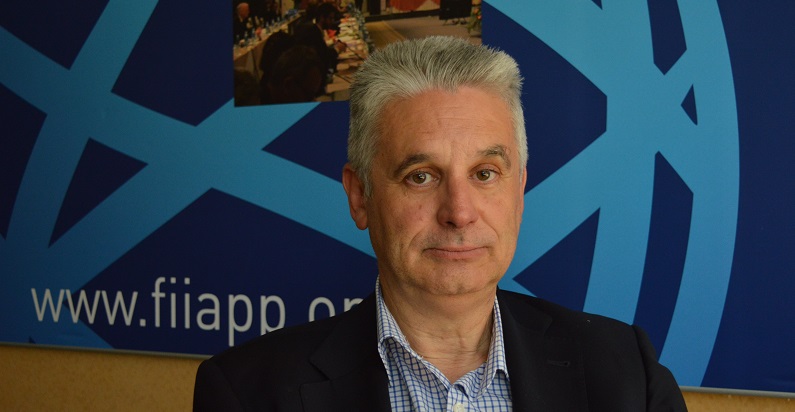-
28 July 2014
Category : Interview
“Security actually has increased in Latin America”
Interview with Javier Albaladejo, Head of the International Cooperation Division of the National Police Force (CNP).

He began his career with the FIIAPP in the 90s, when the Foundationcreated police cooperation twinning projects with Bulgaria and Slovakia. He states that this institution is a “reference partner” for the European Commission (EC) and that it helps Spain be awarded cooperation projects. In this interview, Javier Albaladejo reviews the present and future of the CNP and the FIIAPP, also of the EU and, specifically, he talks about security in Latin America and the FIIAPP-led AMERIPOL-EU projectto combat cocaine routes.
What most concerns you now about the level of security in Spain, and where are you focusing your efforts in international cooperation?
International cooperation has various aspects. The first is operational cooperation for improving one’s own security levels, thereby confronting any common crime threats we may have in the international community. Here, organized crime and jihadist terrorism are clearly the main threats. There is also another part, which is cooperation in area of technical assistance and training of other states, which is based more on the principle of solidarity and of countries helping other countries. In this, the Spanish police is also developing some very important international cooperation systems.
Where is the Spanish police now focusing its international cooperation objectives, and where is its work with the FIIAPP heading?
The joint work of the Spanish police with the FIIAPP is basically oriented towards European Union projects. Another thing is EU projects with third states. From there, we have very diverse cooperation mechanisms. We collaborate with the FIIAPP in two geographical areas: Latin America in general is a strategic target, while Africa as a continent is not so much a target, although certain countries have special importance for Spanish police cooperation. For example, there is a privileged relationship with Morocco, Algeria, Mauritania, Egypt, Syria, Libya…, especially in terms of monitoring the evolution of what is happening in the region, because, from the standpoint of security, this is key for us.
What is the commitment of the European Union in the fight against organized crime in Latin America?
The European Union has been working for years now on helping the countries of Latin America fight organized crime in general and, especially, in the fight against illegal drug trafficking. There are multiple forums where coordinated work is being done, and within this general framework is the EU project with AMERIPOL, which has been led by a Spanish police official. We are very satisfied with the results. In fact, we are thinking about trying to obtain funding from the EU for a second phase of the project that would enable us to involve more states in the zone in the project and expand activities beyond drug trafficking to include computer crime and organized crime.
The tremendous economic growth occurring in Latin America in recent years has not led to an increase in security…
Security actually has increased in Latin America, but you can only see this if you compare the current statistics with the previous ones. If we apply European security standards to this region of the world, there is a difference no doubt, as crime rates there are higher. But in their original context, their security is getting better and better. This is a gradual process.
Where does the focus need to be placed to keep reducing crime?
On prevention. And there, economic, sociological and cultural conditions are a fundamental factor. When a society has experienced armed conflicts, the value of other people’s right to life is really diminished from an ethical standpoint. Colloquially we tend to say that ‘life has no value’. Then there is a social context that has to be considered, and an economic context, that must allow greater development of Latin American societies. I hope that their growth in recent years translates into measures for improving the standard of living of the people who live in these societies. Crime doesn’t go down only because of the actions of the police or judges but also as a result of the creation of socio-economic conditions that allow the potential of people inclined to commit criminal acts to progressively diminish.
What do you think will be the direction of EU development cooperation policy for Latin America following the latest changes in the European Parliament?
There is a high degree of policy agreement in the European majority parties and, therefore, I don’t think there will be significant changes in these policies. In fact, I expect them to grow.
The views and opinions expressed in this blog are the sole responsibility of the person who write them.






